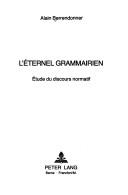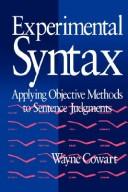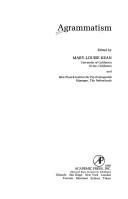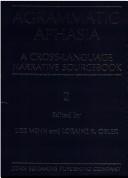| Listing 1 - 10 of 22 | << page >> |
Sort by
|
Book
ISBN: 9789027208699 9027208697 9027259895 9789027259899 Year: 2021 Volume: 219 Publisher: Amsterdam: John Benjamins,
Abstract | Keywords | Export | Availability | Bookmark
 Loading...
Loading...Choose an application
- Reference Manager
- EndNote
- RefWorks (Direct export to RefWorks)
"This book investigates phenomena at the grammar-discourse interface with a strong focus on discourse markers, whose development and concrete uses in a given language tend to be based on a close interplay of grammatical and discourse-related forces. The topics range from the transition of linguistic signs "out of" sentence grammar and "into" the domain of discourse to differences between more grammatical vs. more discourse-pragmatic expressions in terms of structural behavior and cognitive processing, and the different, intricate ways in which the usage conditions and meanings of grammatical constituents or structural units are affected by the discourse context in which they are used. The twelve studies in this book are based on fresh empirical data from languages such as English, Basque, Korean, Japanese and French and involve the study of linguistic expressions and structures such as pragmatic markers and particles, comment clauses, expletives, adverbial connectors, and expressives"--
Book
ISBN: 1443821888 9781443821889 9781443821551 1443821551 Year: 2010 Publisher: Newcastle upon Tyne Cambridge Scholars
Abstract | Keywords | Export | Availability | Bookmark
 Loading...
Loading...Choose an application
- Reference Manager
- EndNote
- RefWorks (Direct export to RefWorks)
"This book is a contribution to the ongoing debate in agrammatism, an acquired language disorder resulting from left hemisphere brain damage. The aim of the book is to give a comprehensive account of agrammatism and outlines and critically examines the different accounts of agrammatic production and asyntactic comprehension, to address morphological and structural properties of Moroccan Arabic agrammatic speech, and to put under scrutiny Friedmann and Grodzinsky's (1997) syntactic account of tense and agreement in production and across modalities. The book attempts to answer two important research questions: are tense and agreement dissociated as predicted by the Tree-Pruning Hypothesis (Friedmann and Grodzinsky, 1997); and, is the tense/agreement dissociation 'production-specific', or does it extend to comprehension and grammaticality judgment. A third objective of the book is to examine the comprehension abilities of four Moroccan Arabic-speaking agrammatic subjects in the light of the Trace Deletion Hypothesis (Grodzinsky, 1995 a, b). A major research question is whether or not active sentences and subject relative sentences are understood better than object relative sentences. The book takes the view the tense/agreement dissociation reported for Hebrew (Friedmann and Grodzinsky, 1997) and German (Wenzlaff and Clahsen, 2003) can be replicated in Moroccan Arabic. However, the syntactic account as outlined in Friedmann and Grodzinsky (1997) cannot account for the tense/agreement dissociation as Moroccan Arabic has the agreement node above the tense node. In addition, the Trace Deletion Hypothesis cannot account for the comprehension difficulties experienced by the four Moroccan Arabic-speaking agrammatic subjects; the case is so because both subject relatives and object relatives are understood below chance level. Based on data collected through different experimental methods, it is argued that the deficit in agrammatism cannot be explained in terms of a structural account, but rather in terms of a processing account. Access to syntactic knowledge tends to be blocked; grammatical knowledge, however, is entirely intact."--Publisher's description.
Agrammatism. --- Arabic language --- Semitic languages --- Agrammatic aphasia --- Agrammatologia --- Grammatical speech disorders --- Speech disorders, Grammatical --- Aphasia --- Grammaticality (Linguistics)

ISBN: 3261050268 9783261050267 Year: 1982 Volume: 1 Publisher: Berne : Lang,
Abstract | Keywords | Export | Availability | Bookmark
 Loading...
Loading...Choose an application
- Reference Manager
- EndNote
- RefWorks (Direct export to RefWorks)
French language --- Pragmatics --- Grammaticality (Linguistics) --- Grammaticalité --- Français (Langue) --- Grammar --- Textbooks --- Grammaire --- Manuels --- -Grammaticality (Linguistics) --- Grammaticalness (Linguistics) --- Acceptability (Linguistics) --- Grammar, Comparative and general --- Linguistics --- Langue d'oïl --- Romance languages --- -Textbooks --- Textbooks. --- Grammaticality (Linguistics). --- Grammaticalité --- Français (Langue) --- Grammar&delete& --- French language - Grammar - Textbooks
Book
ISBN: 2858168377 9782858168378 Year: 2006 Publisher: Toulouse: Presses universitaires du Mirail,
Abstract | Keywords | Export | Availability | Bookmark
 Loading...
Loading...Choose an application
- Reference Manager
- EndNote
- RefWorks (Direct export to RefWorks)

ISBN: 0761900438 Year: 1997 Publisher: Thousand Oaks, Calif. Sage
Abstract | Keywords | Export | Availability | Bookmark
 Loading...
Loading...Choose an application
- Reference Manager
- EndNote
- RefWorks (Direct export to RefWorks)
Grammar --- Acceptability (Linguistics) --- Grammar, Comparative and general --- Linguistics --- Language and languages --- Syntax --- Grammaticality (Linguistics) --- Sociolinguistics --- Methodology --- Philology --- Grammar, Comparative and general Syntax

ISBN: 0124028306 1483277666 9780124028302 Year: 1985 Publisher: Orlando (Fla.): Academic press,
Abstract | Keywords | Export | Availability | Bookmark
 Loading...
Loading...Choose an application
- Reference Manager
- EndNote
- RefWorks (Direct export to RefWorks)
Aphasia --- Linguistics. --- Agrammatism --- Agrammatic aphasia --- Agrammatologia --- Grammatical speech disorders --- Speech disorders, Grammatical --- Grammaticality (Linguistics) --- Linguistic --- psychology. --- Linguistics --- psychology --- Psycholinguistics --- Neuropathology --- Aphasia - psychology

ISBN: 1283548992 9786613861443 9027273510 9789027273512 9789027273512 902722045X 1556190247 9027220468 1556190255 9027220476 1556190263 9027220484 1556190271 9789027220455 Year: 1990 Publisher: Amsterdam Benjamins Publishing Cy
Abstract | Keywords | Export | Availability | Bookmark
 Loading...
Loading...Choose an application
- Reference Manager
- EndNote
- RefWorks (Direct export to RefWorks)
Agrammatism. --- Aphasia. --- Brain --- Language disorders --- Speech disorders --- Agrammatic aphasia --- Agrammatologia --- Grammatical speech disorders --- Speech disorders, Grammatical --- Aphasia --- Grammaticality (Linguistics) --- Diseases --- Psychiatry --- Neuropathology --- Psycholinguistics
Book
ISBN: 3110289776 130620528X 9783110289770 9783110290011 3110290014 9783110488067 311048806X 9781306205283 Year: 2014 Publisher: Berlin De Gruyter Mouton
Abstract | Keywords | Export | Availability | Bookmark
 Loading...
Loading...Choose an application
- Reference Manager
- EndNote
- RefWorks (Direct export to RefWorks)
Grammar is said to be about defining all and only the 'good' sentences of a language, implying that there are other, 'bad' sentences - but it is hard to pin those down. A century ago, grammarians did not think that way, and they were right: linguists can and should dispense with 'starred sentences'. Corpus data support a different model: individuals develop positive grammatical habits of growing refinement, but nothing is ever ruled out. The contrasting models entail contrasting pictures of human nature; our final chapter shows that grammatical theory is not value-neutral but has an ethical dimension.
Grammar, Comparative and general. --- Grammaticality (Linguistics). --- Grammaticality (Linguistics) --- Grammar, Comparative and general --- Languages & Literatures --- Philology & Linguistics --- Grammaticalité --- Grammaire comparée et générale --- Grammaticalness (Linguistics) --- Acceptability (Linguistics) --- Linguistics --- Comparative grammar --- Grammar --- Grammar, Philosophical --- Grammar, Universal --- Language and languages --- Philosophical grammar --- Philology --- Grammar, Comparative --- Cultural Imperialism. --- Grammar Acquisition. --- Grammar. --- Grammaticality. --- Syntax.
Book
ISBN: 9783110356106 3110356104 9783110356854 9783110394429 3110356856 3110394421 9783110356861 3110356864 Year: 2014 Publisher: Berlin De Gruyter Mouton
Abstract | Keywords | Export | Availability | Bookmark
 Loading...
Loading...Choose an application
- Reference Manager
- EndNote
- RefWorks (Direct export to RefWorks)
This volume, which has textbook character, is intended to provide an in-depth introduction to different theoretical and methodological research frameworks concerned with the role of item-specific grammatical and lexical behaviour.
Grammar --- Analyse linguistique. --- Collocation (Linguistics). --- Collocation (linguistique). --- Construction grammar. --- Grammaire de construction. --- Grammaticality (Linguistics). --- Grammaticalité. --- Linguistic analysis (Linguistics). --- Grammaire de construction --- Collocation (Linguistique) --- Grammaticalité --- Analyse linguistique (Linguistique) --- #KVHA:Taalkunde --- #KVHA:Constructiegrammatica --- #KVHA:Collocaties --- Collocation (Linguistics) --- Grammaticality (Linguistics) --- Linguistic analysis (Linguistics) --- Analysis, Linguistic (Linguistics) --- Analysis (Philosophy) --- Grammar, Comparative and general --- Grammaticalness (Linguistics) --- Acceptability (Linguistics) --- Linguistics --- Semantics --- Semantic prosody --- Collocation. --- Constructions. --- Patterns.
Book
ISBN: 1283280531 9786613280534 902728508X 9789027203519 9027203512 9789027285089 9781283280532 Year: 2011 Publisher: Amsterdam Philadelphia John Benjamins Pub. Co.
Abstract | Keywords | Export | Availability | Bookmark
 Loading...
Loading...Choose an application
- Reference Manager
- EndNote
- RefWorks (Direct export to RefWorks)
This book contains the first in-depth corpus-based description of structural nativization at the lexis-grammar interface in Indian English, the largest institutionalized second-language variety of English world-wide. For a set of three ditransitive verbs give, send and offer -collocational patterns, verb-complementational preferences and correlations between collocational and verb-complementational routines are described. The present study is based on the comparison of the Indian and the British components of the International Corpus of English as well as a 100-million-wor
English language --- Lexicology. --- Grammaticality (Linguistics) --- Linguistic analysis (Linguistics) --- Analysis, Linguistic (Linguistics) --- Analysis (Philosophy) --- Grammar, Comparative and general --- Grammaticalness (Linguistics) --- Acceptability (Linguistics) --- Linguistics --- Language and languages --- Germanic languages --- Grammar. --- Usage. --- Lexicology
| Listing 1 - 10 of 22 | << page >> |
Sort by
|

 Search
Search Feedback
Feedback About UniCat
About UniCat  Help
Help News
News